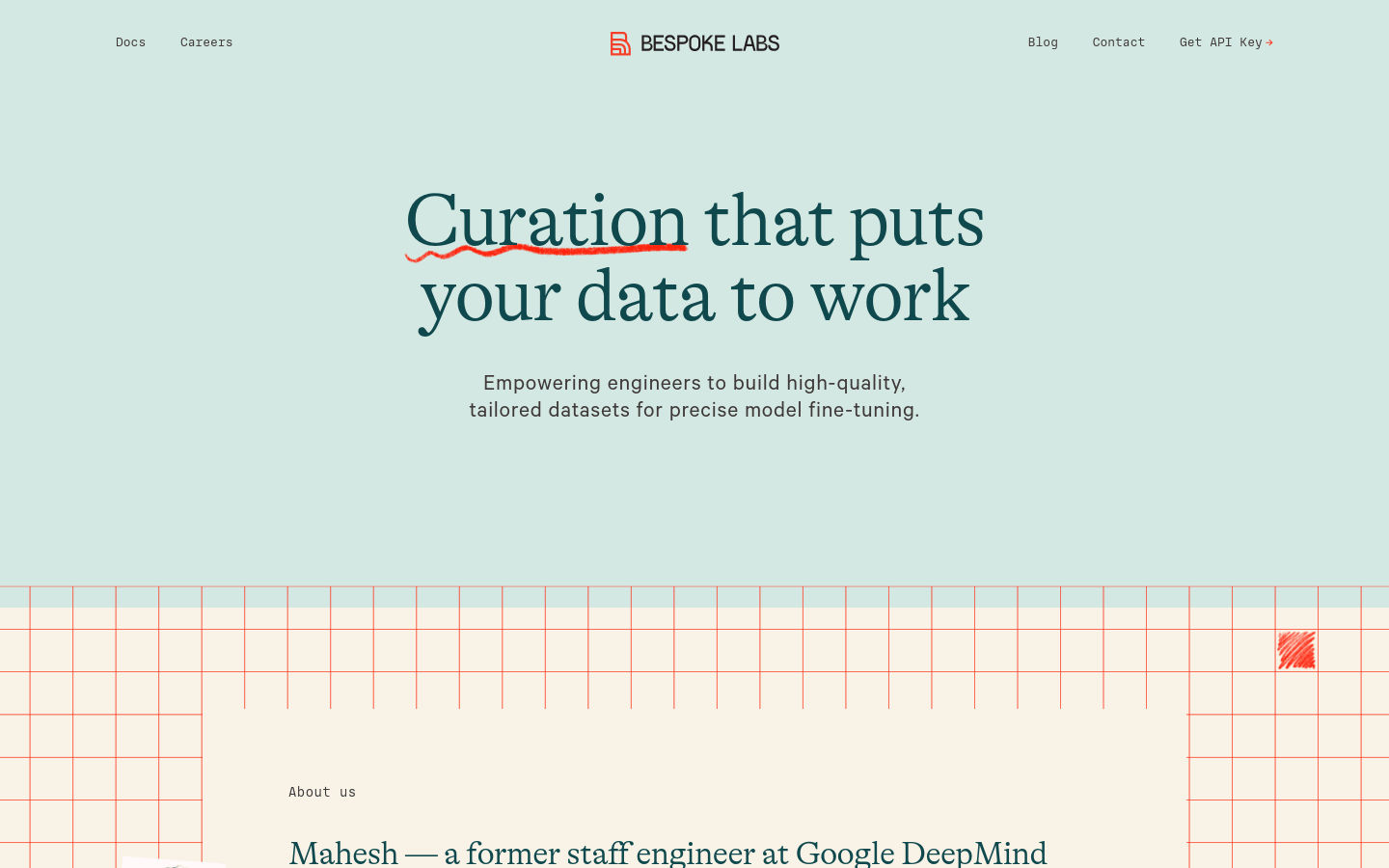

Bespoke Labs
Overview :
Bespoke Labs focuses on providing high-quality customized dataset services to support engineers in precise model tuning. Founded by former Google DeepMind employee Mahesh and UT Austin's Alex, the company aims to improve the acquisition of high-quality data, which is essential for advancing the field. The tools and platforms offered by Bespoke Labs, such as Minicheck, Evalchemy, and Curator, are designed around the creation and management of datasets, enhancing data quality and model performance.
Target Users :
Our target audience includes data scientists, machine learning engineers, and researchers who need high-quality datasets to train and fine-tune their models. The tools and services provided by Bespoke Labs help enhance data quality and model performance, facilitating breakthroughs in the AI field.
Use Cases
Use Minicheck 7B to assess the accuracy of AI-generated content, reducing misinformation.
Conduct standardized evaluations of language models using the Evalchemy platform.
Quickly create synthetic datasets with the Curator tool to expedite the model training process.
Features
Minicheck 7B: A state-of-the-art hallucination detector for assessing the accuracy of AI-generated content.
Evalchemy: A unified language model (LM) evaluation platform providing standardized assessment tools.
Curator: A fast and modular synthetic dataset creation tool.
DATACOMP: A testing platform revolving around 1.28 billion image-text pairs for dataset experimentation.
Provides standardized CLIP training code for evaluating the performance of new datasets.
Supports multi-scale computation, allowing researchers to investigate scaling trends under varying resources.
Reduces common errors in data generation through advanced validation techniques, enhancing model reliability.
How to Use
1. Visit the Bespoke Labs website and register to obtain an API Key.
2. Choose appropriate tools based on your needs, such as Minicheck, Evalchemy, or Curator.
3. Connect to the corresponding service using the API Key and configure it according to the documentation.
4. Use the provided standardized CLIP training code to evaluate the new dataset.
5. Conduct dataset experiments on the DATACOMP platform, designing new filtering techniques or sourcing new data.
6. Test model performance on 38 downstream test sets and optimize the dataset.
7. Analyze the results and adjust the dataset and model parameters based on feedback.
8. Repeat steps 4-7 until satisfactory model performance is achieved.
Featured AI Tools

Fetchfox
FetchFox is an AI-driven web scraping tool. It leverages AI to extract the data you need from raw web pages. Running as a Chrome extension, users can simply describe the desired data in English. With FetchFox, you can quickly collect data such as building lead lists, gathering research data, or surveying market segments. By using AI to scrape from raw text, FetchFox can bypass anti-scraping measures on websites like LinkedIn and Facebook. It can easily parse even the most complex HTML structures.
Data Analysis
413.4K

Comments Analytics
Comments Analyzer is a tool that helps users extract and analyze page comments. It utilizes artificial intelligence technology to extract and quantify emotional information from comments, providing functionalities such as sentiment analysis, entity recognition, and keyword extraction. By analyzing comments, users can understand customer thoughts, feelings, and decision-making processes, ultimately leading to improved customer experience and product or service optimization.
Data Analysis
316.8K














